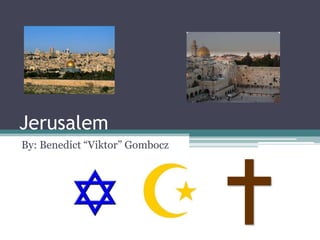
Religious Significance and History of Jerusalem
- 1. Jerusalem By: Benedict “Viktor” Gombocz
- 2. Jerusalem: Important Facts • Jerusalem, by merit of the number and variety of people who have made it holy, is perhaps regarded as the most sacred city in the world. • Jerusalem is significant to the Jews because it is Ir Ha- Kodesh (the Holy City), the Biblical Zion, the City of David, the site of Solomon’s Temple, and the eternal, though not internationally recognized, capital of the State of Israel. • Jerusalem is significant to the Christians because it is where the adolescent Jesus astonished the sages at the Jewish Temple; it is also where He spent His ministry’s final days, and where the Last Supper, the Crucifixion and the Resurrection took place. • Jerusalem is significant to the Muslims because the prophet Muhammad, the founder of Islam, went to heaven there; Jerusalem is the third holiest site of Islam, after the sacred sites of Mecca and Medina. • While closely associated with strong religious commitment and an attraction to numerous pilgrims and sages, Jerusalem has been torn by thirty centuries of conflict and fighting. • Jerusalem is a sanctified city with a rich and ancient history.
- 3. Jerusalem: History • The history of Jerusalem goes back almost 5,000 years. • The Canaanites occupied the city around 2500 BC. • The Jebusites were absorbed into the Jews when David took the city (c. 1000 BC). • David made Jerusalem his kingdom’s capital; Solomon built the first Temple, which held the Ark of the Covenant. • The Babylonian Nebuchadnezzar II destroyed Jerusalem and the Temple in 586 BC, and deported the Jews to Babylonia. • In 537 BC, Cyrus the Great of Persia defeated Babylonia and allowed the Jews to return to Jerusalem and reconstruct their Temple. • Until 333 BC, when Alexander the Great annexed Palestine to his empire, Persia controlled the city. • In 323 BC, Ptolemy I of Egypt added Palestine to his kingdom.
- 4. Jerusalem: History - cont. • Around 198 BC, the Seleucid king Antiochus III triumphed over Judaea (of which Jerusalem was a part), which made it a confluence to Syria. • The Jews subsequently rebelled under Macabees’ leadership and overcame the Syrians. • The Temple was rededicated in 165 BC; the Maacabean, or Hasmonean, empire reigned until Rome took control of the city in 63 BC. • The Romans established a local empire, the house of Herod, to govern most of Palestine; Herod the Great (reigned 40-4 BC) rebuilt most of Jerusalem, the Temple included. • However, Roman governors kept tight control; one of those governors, Pontius Pilate, administratively approved the crucifixion of Jesus Christ.
- 5. Jerusalem: History – cont. • While repressing a major Jewish rebellion, the Romans annihilated the Second Temple in AD 70. • In 135, following the failure of the Bar Kochba revolution, the Jews were expelled from Jerusalem. • From the early 4th century, when Christianity was legalized in the Roman Empire, Jerusalem became a hub of Christian pilgrimage. • The Church of the Holy Sepulcher and numerous other Christian memorials were built. • Other than a short time of Persian reign (614-628), Jerusalem remained under Roman (Byzantine later) occupation until 638, when the Muslim Arabs captured the city. • Between 688 and 691, the Arabs constructed the Dome of the Rock on the site of the Temple.
- 6. Jerusalem at the time of Christ and the Church of the Holy Sepulcher
- 7. Dome of the Rock
- 8. Jerusalem: History – cont. • Jerusalem was taken by the Muslims, who ruled the city until the rise of the Ottoman Empire in 1517. • In 1917, the British gained control of Jerusalem and it thus became part of the British mandate inflicted on Palestine. • During the 1948 Arab-Israeli War, the Arab legions encircled Jerusalem; when the war ended in March 1949, the city was split between Israel (the western city) and Jordan (the eastern city and the old city). • During the 1967 Six-Day War, the Jordanians were pushed eastward past the Jordan River and the entire city was annexed to Israel.
- 9. Jerusalem Today • Modern Jerusalem is a diverse and active city. • As the capital of Israel, it is the location of the Israeli house of parliament (Knesset), along with numerous government offices. • Numerous neighborhoods in Jerusalem are inhabited by Ultra Orthodox Jews (Haridim) who preserve a unique and characteristic style of life. • The neighborhoods of East Jerusalem are predominantly Muslim Arab or Christian Arab, having a unique Middle Eastern sense. • Jerusalem also has a present-day and distinctive cinematheque, which overlooks the old city. • Countless excellent restaurants and cafés are spread out in Jerusalem’s old neighborhoods, providing to every kind of taste.
- 10. Church of Maria Magdalene
- 11. Mount of Olives and Garden of Gethsemane
- 12. Via Dolorosa (Way of Sorrows)
- 14. Bibliography • http://physics.technion.ac.il/~icps24/histo.htm • http://sacredsites.com/middle_east/israel/jerusalem_fact s.html • http://www.israirairlines.com/?mode=page&page=15634
